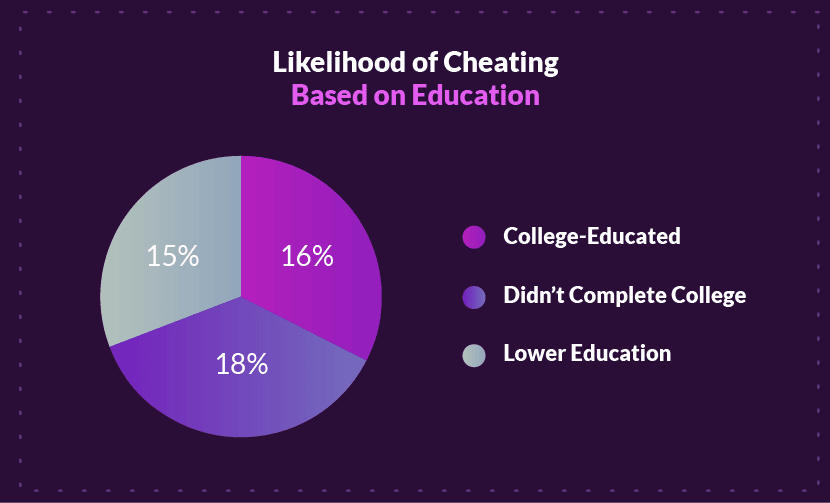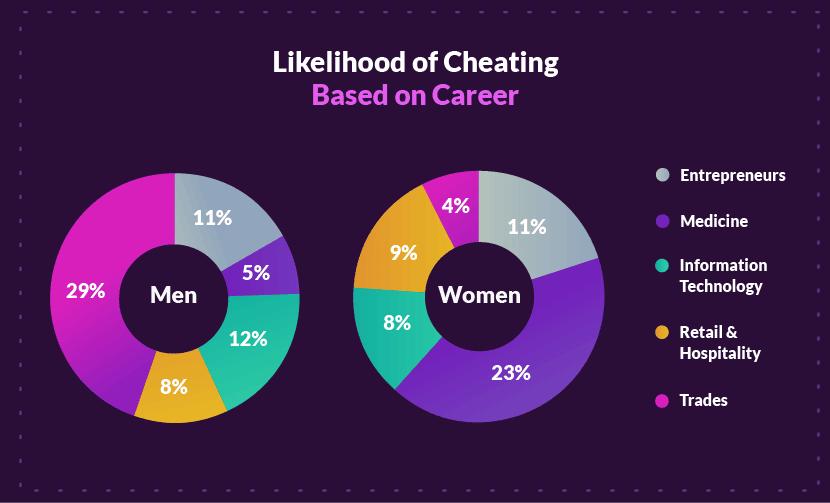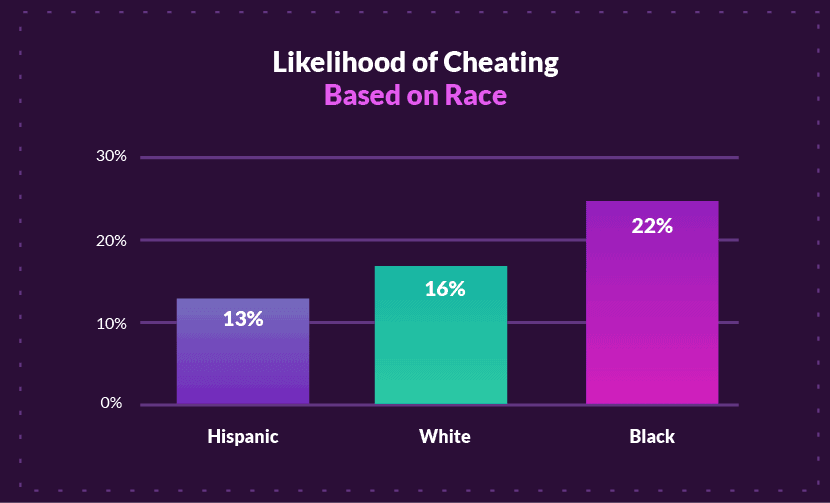
It’s difficult to know if men will cheat more than women (and vice versa), as anyone can tarnish a rocky relationship. Cheating is prefered over expressing unhappiness, which can make it hard to trust even a long-term partner. However, some are more susceptible than others.
After extensive research, I listed some key demographics and discovered which group is most likely to cheat within them. If you recognise any of these warning signs, it’s not necessarily a reason to worry, but it might mean you’ll want some outside insight into your relationship.
For further guidance, you should consider consulting a love psychic, who can help you feel more confident and secure. They can help your feel more confident and secure, root out problems that cause cheating, or help you navigate distrustful feelings. My favorite psychic site is Purple Garden, which has a number of experienced love psychics to choose from.
Age: Middle-Aged People Cheat the Most
Men cheat more than women at almost every age. The notable exception is married women aged 18-29. They are 1% more likely to cheat than men in this demographic.
More middle-aged people cheat overall, and men report the highest level of cheating in their 70s. Women report the highest rates of infidelity in their 60s, with 16% of 60- to 69-year-olds reporting to have had sex outside of marriage.
Interestingly, cheating is lowest among 18- to 29-year-olds at 11% overall. A recent YouGov poll indicated that millennials are equally likely to want to be in a monogamous relationship and to think that the ideal relationship is non-monogamous (43% each).

Political Views: Republicans Cheat the Least
There’s a 4% cheating gap between members of different political parties. 14% of confessed cheaters were registered Republicans, 15% were Independents, and 18% were Democrats.
Education: People With Some College Education Cheat the Most
The extent of one’s education seems to impact the likelihood of cheating. Of those who confessed to cheating, 15% had a high school diploma or less, 16% had obtained one or more college degrees, and 18% had some college education.

Economic Independence: Financially-Dependent Men Cheat the Most
A study by the American Sociological Association shows that in heterosexual relationships, the partner who earns less is more likely to cheat. 15% of husbands who are financially dependent on their wives are prone to infidelity. However, men are less likely to cheat when they earn 70% of the total household income.
The study found that only 5% of women who are financially dependent on their partners are likely to cheat. It further revealed that the more a woman contributes to her household income, the less likely she is to engage in infidelity.
According to a study by Ashley Madison, a dating site for married individuals, the professions with the highest rates of infidelity include retail and hospitality (8% of men and 9% of women), information technology (12% of men and 8% of women), entrepreneurship (11% for both genders), medicine (5% of men and 23% of women), and trades (29% of men and 4% of women).

Sexual Preference: Heterosexual Marriages Experience the Most Infidelity
The information presented is primarily derived from data on heterosexual couples (see the “Disclaimer” section for more information). Research conducted in 2010 involving more than 560 male gay couples revealed that about 45% were in monogamous relationships, and a significant number were engaged in open relationships.
The Rockway Institute, a California-based center for LGBT research and public policy, released a report indicating that young LGBT people express a desire to build enduring partnerships and raise families in their adult years. According to the survey, approximately 80% of the respondents in this demographic anticipate being in committed, monogamous relationships beyond the age of 30.
According to these references, many people within the LGBT community engage in consensual extramarital relations, and younger generations are particularly invested in cultivating prosperous long-term partnerships. To put it differently, compared to those in heterosexual relationships, LGBT people show a lower tendency to cheat.
Race: Conflicting Data
A study published by the IFS concluded that your race may also play a role in how likely you are to cheat on your spouse. In its study, 13% of Hispanic, 16% of white, and 22% of Black respondents admitted to cheating (the study didn’t record responses from any Asian or Native Americans, showing a biased sample group).
However, another study reported that 81% of Black Americans believe that it’s always wrong to cheat. This study linked a higher rate of church attendance with the belief that infidelity is always wrong.

So What Are You Saying?
If the results of this survey are to be believed, you’re most likely to cheat if you’re a Black male pensioner with some college education who votes Democrat, relies on your wife for financial support, and rarely attends church. You’re least likely to cheat if you’re a somewhat-religious Hispanic 80-year-old female Republican with a high school diploma.
Sound unlikely? That’s because it is…
Disclaimer
It’s important to note that it’s very hard to find reliable data about infidelity. Most of the articles I read cited the Institute for Family Studies as a source.
As a politically conservative, right-wing, religious think tank, the IFS probably has an agenda, so its data is likely to be biased. For example, it only surveyed married people (or people who had previously been married), so the experiences of unmarried people in long-term relationships aren’t included. It also didn’t indicate if any of its respondents were in same-sex marriages.
Additionally, statistics on infidelity are usually based on what’s known as self-reporting data. In this case, it means people answer questions, but their answers can’t be verified in any way. The people conducting the survey have to trust that the respondents are answering honestly. The results may not be reliable as they cannot necessarily be replicated.
The results are also completely dependent on the sample of people who are surveyed: a different sample group will probably lead to totally different results.
Conclusion
Men (and especially older men) are more likely to cheat than women, but women aren’t completely innocent. This can make it really hard to trust people, even when you’ve been together for a long time. Consulting with a love psychic can help you feel more confident and secure in your relationship.
Sources
today.yougov.com/topics/politics/survey-results/daily/2018/04/26/04010/3
today.yougov.com/topics/relationships/articles-reports/2020/01/31/millennials-monogamy-poly-poll-survey-data
en.wikipedia.org/wiki/Monogamy
ifstudies.org/blog/who-cheats-more-the-demographics-of-cheating-in-america
hernorm.com/infidelity-statistics/
cheatsheet.com/money-career/study-reveals-jobs-people-likely-cheat-husband-wife.html/
dailymail.co.uk/news/article-6900133/New-data-reveals-race-political-party-social-classes-believe-acceptable-cheat.html
nytimes.com/2018/01/22/well/marriage-cheating-infidelity.html
theatlantic.com/health/archive/2019/05/millennials-are-less-likely-cheat-boomers/588286/



